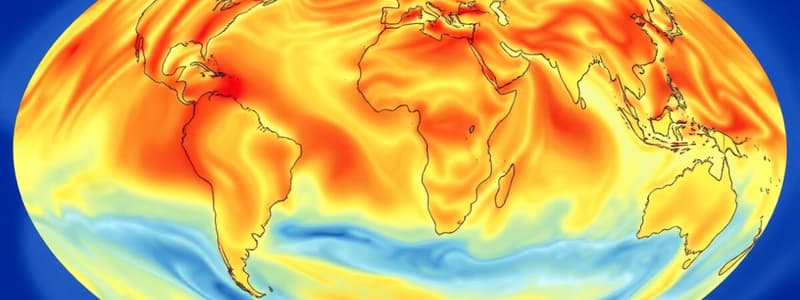Podcast
Questions and Answers
What does SST primarily influence in the environment?
What does SST primarily influence in the environment?
- Seabed geology
- Tidal movements
- Aquatic plant growth
- Climate and weather patterns (correct)
Which method is NOT used for measuring Sea Surface Temperature?
Which method is NOT used for measuring Sea Surface Temperature?
- Satellite remote sensing
- Buoys
- Direct human observation (correct)
- Ship-based measurements
What phenomenon can SST anomalies contribute to?
What phenomenon can SST anomalies contribute to?
- Alteration of tidal patterns
- Formation of coral reefs
- Increase in ocean salinity
- El Niño and La Niña events (correct)
What is a primary application of monitoring Sea Surface Temperature?
What is a primary application of monitoring Sea Surface Temperature?
What long-term trend has been identified in Sea Surface Temperature observations?
What long-term trend has been identified in Sea Surface Temperature observations?
Study Notes
SST (Sea Surface Temperature)
-
Definition: SST is the temperature of the top layer of the ocean, typically the upper few meters, and is measured for various scientific and practical purposes.
-
Significance:
- Influences climate and weather patterns.
- Affects ocean currents and marine ecosystems.
- Plays a role in the carbon cycle and heat exchange between the ocean and atmosphere.
-
Measurement:
- Obtained using satellite remote sensing, buoys, and ship-based measurements.
- Satellite data provides extensive coverage and high temporal resolution.
- In-situ sensors offer precise localized readings.
-
Variability:
- Seasonal changes influenced by solar radiation, ocean currents, and atmospheric conditions.
- Can exhibit anomalies such as El Niño and La Niña, leading to significant global weather impacts.
-
Applications:
- Used in climate modeling and predicting weather systems.
- Important for fisheries management and marine resource assessments.
- Essential for understanding oceanic heat content and climate change implications.
-
Trends:
- Long-term SST trends indicate warming oceans, contributing to global climate change.
- Monitoring SST helps track changes in heat distribution and potential impacts on weather and marine life.
-
Data Sources:
- NOAA (National Oceanic and Atmospheric Administration)
- NASA (National Aeronautics and Space Administration)
- Various international meteorological organizations and research institutes.
Sea Surface Temperature (SST)
- SST is the temperature of the ocean's uppermost layer, typically the top few meters.
- It's measured using satellites, buoys, and ships, providing extensive data that helps to understand and track various phenomena.
- SST influences weather patterns, affecting ocean currents and marine life.
- SST plays a crucial role in the carbon cycle and heat exchange between the atmosphere and the ocean.
- SST exhibits seasonal changes due to factors like solar radiation and ocean currents.
- Anomalous SST patterns, such as El Niño and La Niña, can have significant global impacts on weather.
- SST data allows scientists to model climate, forecast weather, and assess marine resources.
- Long-term SST trends indicate warming oceans, contributing to global climate change.
- Data sources for SST include NOAA, NASA, and international meteorological organizations.
Studying That Suits You
Use AI to generate personalized quizzes and flashcards to suit your learning preferences.
Description
This quiz explores the concept of Sea Surface Temperature (SST), its significance in climate and weather, and its measurement methods. Learn about the variability of SST and its applications in various fields such as climate modeling and fisheries management.




